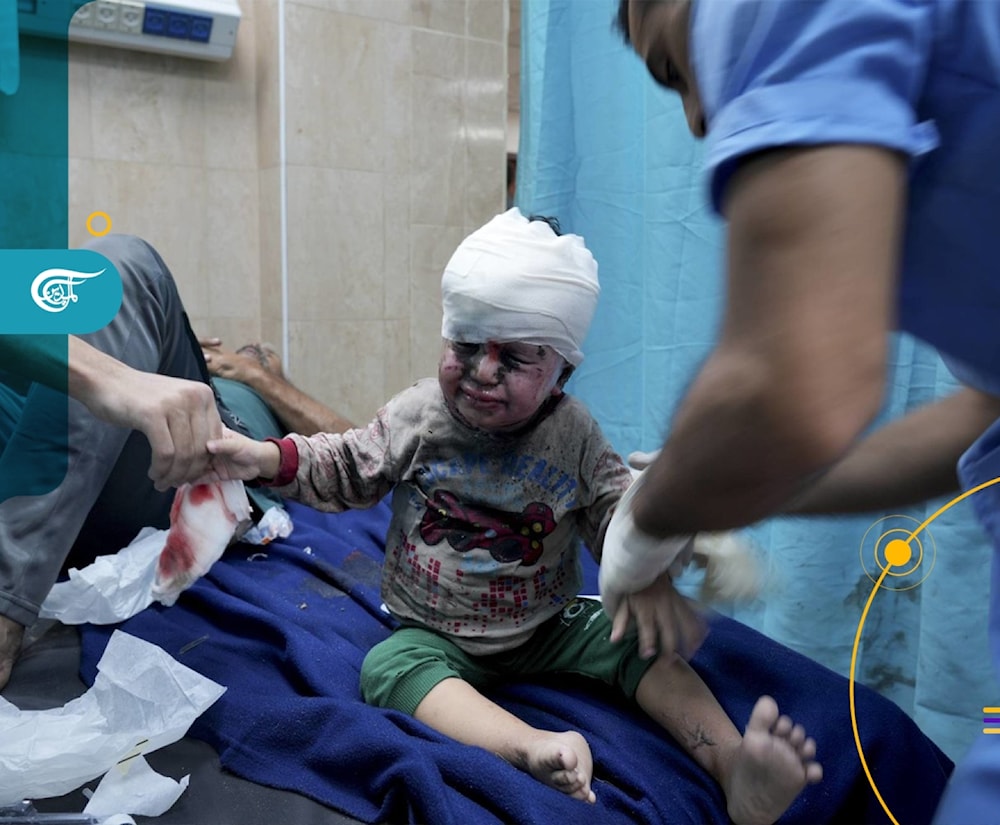Living in agony: 'Israel' forbids anesthetics in Gaza
Since the start of the war on Gaza, the Israeli occupation has barred anesthetics, crutches, and dates from entering the Strip. Even medical equipment such as oxygen cylinders, ventilators, and water filtration systems have also been prohibited.
-

A child is given treatment in a Gaza hospital after being injured in an Israeli airstrike. (Al Mayadeen Net)
For the first time, we found ourselves trying backstreet methods to get a single tablet of Zaldiar, a potent prescription pain relief drug that can only be obtained from licensed establishments or government institutions.
Due to increased demand, the drug was nowhere to be found in Gaza, making sleep nigh impossible for Um Raed, an advanced-stage cancer patient.
Doctors have informed her son that all he can do for her is give her powerful analgesics to ease her pain until she passes away. Suleiman tells Al Mayadeen Net, “Before the war, all kinds of analgesics were available. A month later, and as the injuries grew, especially among patients who had undergone amputations, so did the demand, and getting a single tablet became a days-long effort. We now have to watch our cancer-stricken mother die 100 deaths each night.”
In the past three months, the six brothers worked diligently to provide any kind of pain relief medicine for their mother. Suleiman described their ordeal, saying, “Not one stone was left unturned. We’ve tried all private pharmacies and black market dealers. We paid $30 for a single tablet, then $300 for a strip, until we couldn’t afford it anymore. My mother’s gone now. We buried her in the street opposite where we’re staying now… We will never forgive ourselves for every second of pain she had to endure.”
A medical source working at Kamal Adwan Hospital, northern Gaza, told Al Mayadeen Net, “Since the beginning of the war, no potent analgesic was allowed into Gaza on aid trucks, such as Morphine, Tramadol, Zaldiar, Lyrica, and even Cetamol and Paracetamol. The Health Ministry no longer has any of these pain relief drugs, and they can no longer be found in companies and private pharmacies. In a single month, demand grew by 1000%. Thousands of injured need them for pain relief, stocks were not replenished, and the families of the wounded have to suffer to procure these drugs for them. Walking through the hospital’s wards, you can hear the patients’ constant screams and moans. Under normal circumstances, they would’ve been given doses of painkillers to soothe their suffering.”
On the street, Palestinians in Gaza have grown accustomed to the sight of the amputees being carried by their families, says Abou Imad, seen walking around carrying his friend Bilal, who had lost both of his legs. “He was discharged from the hospital two months after his injury. We asked for a wheelchair, but we were told they couldn’t spare any from the hospital, where they were already scarce. So we went to associations specialized in giving out medical equipment for the injured, to no avail as well. All such organizations have either been bombed or are no longer in service for the time being.”
According to a managerial source in a private medical equipment company, durable medical equipment, meant to improve the patients’ quality of life after they are discharged from the hospital, has also not entered the Strip since the onset of the war. The source tells Al Mayadeen Net, “Israel has bombed warehouses and stocks belonging to medical supply companies. We’re talking here about the destruction of 15 pharmacies and warehouses belonging to Zant Medical, the largest company and biggest importer of this equipment. The company and all of its branches are no longer operational, and its storehouses were looted because of the lack of security. Finding crutches or a wheelchair (electric or regular) at this time is extremely difficult, especially with the large number of injuries and the absence of import.”
It is noteworthy that US broadcaster CNN released an investigation showing how “Israel” has, since the start of the war, prevented anesthetics, crutches, and dates from entering Gaza and has also listed oxygen cylinders and water filtration systems under the "no entry" category for humanitarian aid trucks.

 4 Min Read
4 Min Read








